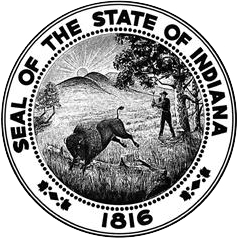Statewide Literacy Goal
In February of 2022, the Indiana Department of Education (IDOE) published Indiana’s Priorities for Early Literacy, which presented a rigorous analysis and set of goals to address the concern of literacy rates for Hoosier students. This plan presented a vision and mission for the future of Indiana’s literacy accomplishments, which include an emphasis on science of reading, a term used to describe the body of research on reading, its development, and best practices for its instruction.
During the 2023 legislative session, Indiana legislated a definition of the science of reading.
IC 20-18-2-17.5 defines science of reading as:
a vast, interdisciplinary body of scientifically based research that:
(1) requires the explicit, systematic inclusion of the following five (5) essential components:
- (A) Phonemic awareness.
- (B) Phonics.
- (C) Fluency.
- (D) Vocabulary.
- (E) Comprehension;
(2) is supported by evidence that informs:
- (A) how proficient reading and writing develop;
- (B) why some students have difficulty with reading and writing; and
- (C) how to effectively assess and teach reading and writing to improve outcomes for all students; and
(3) has a demonstrated record of success, and when implemented, leads to increased student competency in the areas of:
- (A) phonemic awareness;
- (B) phonics;
- (C) reading fluency;
- (D) vocabulary development;
- (E) oral language skills;
- (F) reading comprehension; and
- (G) writing and spelling.
Early Literacy Initiatives
- Indiana Literacy Cadre Support
- Science of Reading Learning Lab Modules
- Science of Reading School Grant Support
- Early Literacy Achievement Grant Support
Early Literacy Endorsement
Indiana’s Early Literacy Endorsement is legislatively-required for those who plan to renew a Professional Educator License while teaching literacy to PK through grade five students. This endorsement was developed to ensure that Indiana educators have the necessary skills and knowledge in science of reading to best serve our students and ensure 95% of third grade students can read by 2027.
To support Indiana’s statewide goal of ensuring 95% of third grade students can read by 2027, House Enrolled Act (HEA) 1558 (2023) required the Indiana State Board of Education (SBOE) to establish a required early literacy endorsement for future teachers applying for an initial Professional Educator License covering the Pre-K-5 grade span or special education after June 30, 2025. To further strengthen the professional knowledge of educators who already hold an existing Pre-K-5 or special education license, Senate Enrolled Act (SEA) 1 (2024) revised Indiana Code (IC) 20-28-5-19.7 to also require current teachers to add the early literacy endorsement at the time of their license renewal that falls on or after July 1, 2027. SEA 1 also includes a new section, IC 20-28-5-19.8, which details how an educator may apply for a waiver that provides a one year extension to meet the early literacy endorsement requirements in some cases, which IDOE must submit in a report to the Legislative Council by a specified date. This legislation also requires instructional coaches to have an early literacy endorsement beginning July 1, 2025, for schools with an IREAD pass rate below 70%.
General Guidance
- Early Literacy Endorsement Frequently Asked Questions (FAQs)
- List of Approved Trainings
- Memo: March 20, 2024 - Early Literacy Endorsement Requirements and Support for Indiana Educators
- Memo: April 5, 2024 - Early Literacy Endorsement Requirements and Support for Indiana Educators
- Memo: April 15, 2024 - Clarity Regarding Indiana’s New Early Literacy Endorsement for Teachers Who Hold a PK-6 or Special Education License
- Memo: May 17, 2024 - New Flexible, Asynchronous Options for Keys to Literacy Participation
- Memo: July 5, 2024 - Approval Process for 80 Hours of Professional Development to Support Early Literacy Endorsement Requirements and Praxis Voucher Request for Current Educators
Professional Development Support
- Keys to Literacy IDOE Partnership Webpage
- Press Release: March 20, 2024 - Indiana Provides Educators A Free Opportunity to Earn a Literacy Endorsement
- Press Release: May 8, 2024 - To Help Overcome Indiana’s Literacy Crisis, Additional Training Opportunities Now Available for Educators
Praxis Teaching Reading: Elementary 5205 Exam
LVIS Application for Early Literacy Endorsement
The Indiana Department of Education’s (IDOE’s) Priorities for Early Literacy and other literacy initiatives are organized below by age and grade-level bands containing additional, in-depth literacy resources.
